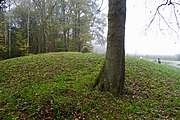| Revision as of 07:09, 28 November 2019 editThe Anome (talk | contribs)Edit filter managers, Administrators252,931 edits {{coord|53.0618|N|6.6861|E|region:NL|display=title}}Tag: 2017 wikitext editor← Previous edit | Revision as of 15:00, 10 January 2021 edit undoLois12jd (talk | contribs)Extended confirmed users3,821 edits Template, categoryNext edit → | ||
| Line 22: | Line 22: | ||
| {{Commonscat|Strubben-Kniphorstbos, Anloo}} | {{Commonscat|Strubben-Kniphorstbos, Anloo}} | ||
| * on ''www.drentscheaa.nl'' | * on ''www.drentscheaa.nl'' | ||
| {{National parks of the Netherlands}} | |||
| {{coord|53.0618|N|6.6861|E|region:NL|display=title}} | {{coord|53.0618|N|6.6861|E|region:NL|display=title}} | ||
| ] | |||
| {{DEFAULTSORT:Strubben-Kniphorstbos}} | |||
| ] | ] | ||
| ] | ] | ||
| ] | |||
| ] | |||
Revision as of 15:00, 10 January 2021

The Strubben–Kniphorstbos is a nature reserve of 377 hectares, located between Anloo and Schipborg in the Dutch province of Drenthe. It is the only archaeological reserve in the Netherlands.
The park's composite name is derived from the 'stubby' oaks in the area, and by Gerrit Kniphorst [nl], who was in the 19th century the owner of the then heathlands. The site was in use for the most part of the 20th century (from 1938) as a military training ground.
Reserve
In 2006 the area was placed under the administration of Staatsbosbeheer and designated as an archaeological national monument. The layout of the forest was then managed according to the landscape approach, taking into account the historical land use in different periods. As a nature reserve, the reserve partly falls under the Drentsche Aa area, a Natura 2000 area.
The province of Drenthe is rich in archaeological remains of the funnelbeaker culture, with 54 extant dolmens, of which two (D7 and D8) are within the boundaries of the reserve. It also houses some sixty burial mounds.
References
External links
- Cultural historical inventory of the Strubben-Kniphorstbos on www.drentscheaa.nl
53°03′42″N 6°41′10″E / 53.0618°N 6.6861°E / 53.0618; 6.6861
Categories:


